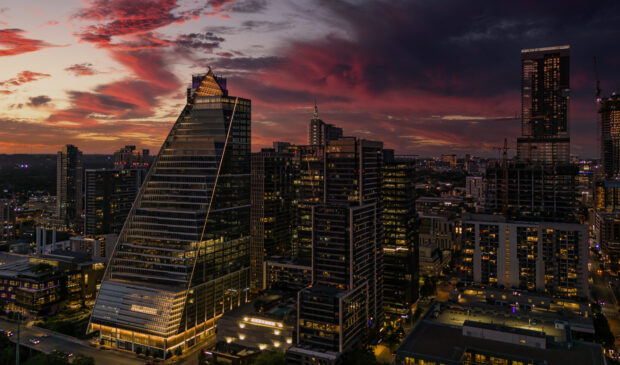About the Author
Chad Swiatecki is a 20-year journalist who relocated to Austin from his home state of Michigan in 2008. He most enjoys covering the intersection of arts, business and local/state politics. He has written for Rolling Stone, Spin, New York Daily News, Texas Monthly, Austin American-Statesman and many other regional and national outlets.
Newsletter Signup
The Austin Monitor thanks its sponsors. Become one.
Most Popular Stories
- Parks Board recommends vendor for Zilker Café, while voicing concerns about lack of local presence
- City leaders evaluate surprising ideas for water conservation
- Office slowdown sparks new downtown housing ambitions
- Audit: Economic official granted arts, music funding against city code
- Downtown Historic Resource Survey eyes seven new districts eligible for designation
-
Discover News By District
Popular Whispers
Sorry. No data so far.

Panelists see progress, problems in Austin’s management of nightlife economy
Friday, September 20, 2024 by Chad Swiatecki
Entertainment industry leaders see promise in Austin’s recent land use and policy changes that could positively impact the area’s nightlife economy, though they plan to push for further changes to streamline planning and approvals for those businesses.
An online panel on Thursday hosted by the Nite Cap Alliance advocacy and trade group featured city entertainment services manager Brian Block, who was speaking as a board member of Nite Cap, and Nicole Klepadlo, executive director of the Red River Cultural District. The panel was focused on Block’s recent paper that looks at the issues on public planning policy that come into play in creating nightlife culture.
Block said the city’s recent decision to reduce or eliminate parking minimums on new developments and the creation of new land use definitions for music venues and performance spaces were needed to reduce longtime barriers to opening those businesses outside of downtown Austin.
“Those have been two of the biggest barriers for new independent venues and hospitality businesses, like bars and multi-use creative spaces. Downtown, that’s not been a big issue because you can pretty much do anything you want in terms of uses in most of downtown, and we haven’t had parking minimums or requirements downtown here. But outside of downtown, historically a lot of parking was required,” he said, noting that other cities like Philadelphia have seen positive results from similar moves.
“For performance venues with music, comedy, other types of cultural performance, it doesn’t require that special bar zoning. I think that’s a huge improvement,” he said.
Klepadlo said the land use changes are making it possible for downtown music venues that may face steep rent increases to relocate outside the city core without facing months of public hearings and approvals that had been required for the previous bar and nightclub use that those businesses fell under. With many areas of the city now accessible, she said there are options aside from closure.
“There’s been a lot of work on identifying areas within the city that now would allow these performance venues to be in those spaces that likely would not have happened before. That’s a huge win,” she said. “What the city is saying is we recognize there’s a problem with affordability. We recognize there’s a problem with retaining spaces in areas that have higher market value, higher market potential, and they’re creating other alternatives so that we don’t lose the fabric.”
Klepadlo said the scarcity and cost of downtown parking is one persistent problem she and other music stakeholders are still working to solve – to help musicians unload easily near where they are performing and make it easier for patrons to visit their preferred clubs. She also pointed toward the need for City Council to approve a long-planned framework for creating new cultural districts around the city, while providing the appropriate level of funding and other resources to enhance the designated areas as much as possible.
Block praised the city for its recent ordinance change that will require new developments near performance spaces and music venues to conduct sound assessments and likely plan the needed soundproofing to prevent quality-of-life issues for residents.
To that end, he critiqued the practice of utilizing conditional use permits for many outdoor performances. He said the lengthy process could likely be handled administratively via proper planning with business owners, rather than requiring extensive public notification and comment.
“Those maybe are still useful to manage conflicts, but let’s lean towards allowing more kinds of nightlife uses and activities and allowing them without conditional use permits where appropriate,” he said. “They’re attempting to manage operational conflicts through a conditional or special use. They’re really not good at that. They’re too static for that. And it does seem like there’s a place for them, but sometimes they’re overly broad and they really just are a place for people to oppose it, oppose nightlife activity or use, and it prevents it from starting up.”
Photo made available through a Creative Commons license. This story has been changed since publication to clarify Brian Block’s position and comments on conditional use permits.
The Austin Monitor’s work is made possible by donations from the community. Though our reporting covers donors from time to time, we are careful to keep business and editorial efforts separate while maintaining transparency. A complete list of donors is available here, and our code of ethics is explained here.
You're a community leader
And we’re honored you look to us for serious, in-depth news. You know a strong community needs local and dedicated watchdog reporting. We’re here for you and that won’t change. Now will you take the powerful next step and support our nonprofit news organization?


